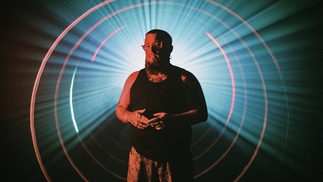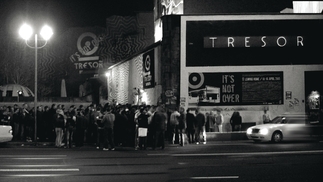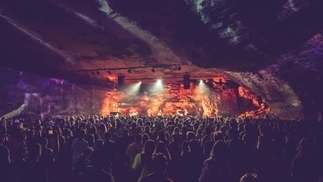'Seeing Through Shadows'
The seminal tracks that changed dance music forever

Loco Dice 'Seeing Through Shadows' (m_nus)
In the mid-noughties, techno was at a crossroads. Sidelined by the glamour of electroclash, the booming bass riddims of breakbeat, drum & bass and the nascent dubstep scene, and house music’s enduring funk-tionality, techno had travelled into a cultural cul-de-sac. Increasingly made up of abrasive panel-beating tracks, it was basically too banging — and too blokey.
This was the problem that Detroit originators Robert Hood and Daniel Bell had identified more than a decade before, when they laid the blueprint for the minimal techno sound to counteract the gabber and hardcore techno — or tekkno — of the time.
Richie Hawtin under his Plastikman moniker had also dabbled with minimal techno in the early ‘90s, as had other techno pioneers such as Carl Craig and Surgeon, while Basic Channel in Berlin dealt with the dubbier end of the stripped-down sound.
After the harder-faster-louder rush past the Millennium, producers and DJs began to look at how to inject more soul and funk into the music. 'Panel-beating' techno could certainly make you wiggle, but it was becoming restrictive.
The micro-house – or click house – sound was offering more creative options: glitchy, repetitive, with more options for creative sampling. German labels like Kompakt, Perlon and Traum Schallplatten began dealing with more stripped-back sounds, and German techno in general was slowing and expanding as its capital, Berlin, began mutating into the European techno Mecca.
So often the barometer for electronic music trends, Ibiza was — and probably always will be — a house music island, but its famed after-hours venue DC10 always likes to try something a bit different.
“I was the only German with Ricardo [Villalobos], and we thought, ‘Let’s bring a little bit of Steve Bug, let’s bring Daniel Bell, let’s make it sexy and slower’ — totally different to what everybody else was playing,” Loco Dice tells DJ Mag, talking about his early days at DC10 in the early noughties. “It worked. It was funky, it was sexy — and then it became way too much, like everything.”
Largely as a result of Berlin clubs like Berghain and Watergate, the wealth of German vinyl-only labels, the secret location Secretsundaze parties in London and the odd night at Fabric helmed by Craig Richards, the explosion of dissociative drug ketamine onto the club scene, and technological developments such as Ableton — which meant less focus on beat-matching, allowing a DJ to be more creative on the hoof — a disparate scene was starting to foment. But DC10 in Ibiza was, arguably, the catalyst.
Every Monday in Ibiza throughout the noughties, DC10 was the place to be. Dice had secured his residency in the early noughties, largely off the back of his 2001 naughty tribal club hit ‘Phat Dope Shit’, and had been laying down the sounds in the disused aircraft hangar for the after-hours sunglasses crew for a few seasons — alongside jocks like Luciano, Tania Vulcano and Ricardo Villalobos. When he came back from one of these sessions to the studio in Hannover, Germany, where he worked with Martin Buttrich, he came up with ‘Seeing Through Shadows’ — the defining track of the minimal techno era. And it was all done in a day.
Dice had come back from one of his Ibiza trips bubbling with ideas. “It was a time when I was in Ibiza a lot, and I came back after the weekend — on a Tuesday or Wednesday — completely messy in my head,” Dice tells DJ Mag. “I came to the studio and we started to work like we always did, one track a day, and the second day we just finalised the track with fresh ears, tweaked it here and there.
“I was playing these kinds of minimal tracks at DC10, and then going to Amnesia,” Dice continues. “I had this whole vision of how it should sound, and what sounds I wanted, and when you hear all the rims and the hi-hats and everything, it’s a reconstruction of things like the ice machine at Amnesia in the breakdown. These are the feelings I transported to the studio, and we were sitting there and playing with a lot of sounds.”
Dice had been working with Buttrich, who also engineered a lot of Timo Maas’s stuff, for a while. “It’s great because we understand each other. He really understands how I want things,” he says. “Was it my idea to introduce the wandering melody line? Not really, it was my energy and idea but we worked things out together. Somebody would sit there on the piano and play a stupid line and the other comes and plays it better, and then the other says ‘Let’s do it this way’. This is how I work with Martin.”
The two may have worked on the scene-defining 10-minute opus together, but it was verifiably Dice's track. “I come and say ‘This is what I think, these are my feelings, these are the sounds that I’ve collected’, and we try to work on it. There’s a lot of his input into it as well,” he declares, “without being Martin Buttrich too much.”
Standing out by virtue of its muted ascending/descending keys, 'Shadows' was done on a mix of equipment — in an amazing four hours. “We used Logic, ProTools, the Moog... a lot of stuff,” the Desolat boss says. “Lexicon delays, reverbs, and an analogue mixer of course. The topline was just a synth, a collection of sounds which we modulated.”
Dice started playing the track out, around the same time as he was playing his analogue-sounding ‘Carthago’ release on Cocoon, “but ‘Seeing Through Shadows’ had the melody that everybody kept in mind,” he says. “People went crazy for it!”
It took ages to come out on Minus, after which Dice was sick of it by his own admission, but he's grown to love it again. “People still ask me for it, I played it at Cocoon closing in Ibiza this summer,” he says.
'Shadows' surfed the crest of the minimal wave before the eventual clubland backlash/fall-off. So is minimal dead now? “No, minimal is not dead!” he says, emphatically. “Nothing is dead! Everything is there, you just don’t give it a name anymore. A lot of those tech house tracks are minimal, but minimal is not cool anymore, so they call it tech house. But for me it’s not tech house or minimal, it’s just electronic music.”





